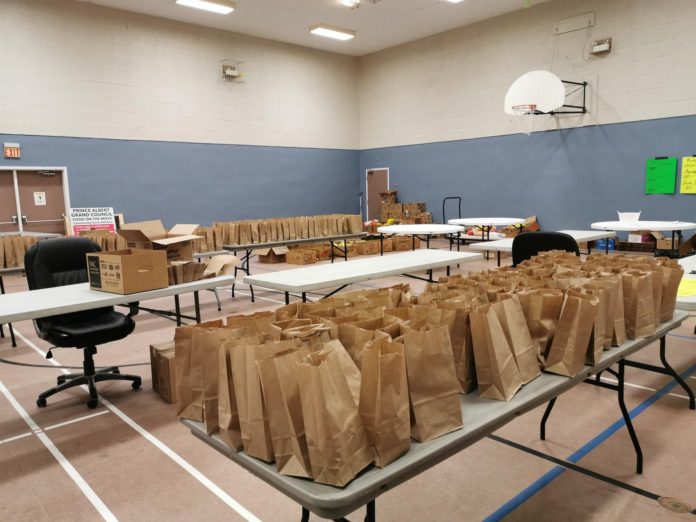
Saskatchewan may be gradually returning to a new normal as the Re-Open Saskatchewan plan moves forward, but some people can’t just sit back and wait for normalcy to arrive.
These people see things that need to be done and they stop at nothing to do them, especially when it comes to giving back to others.
Prince Albert has Natalie Guimond, who, with $500 and the back seat of her car, began feeding people who would be left with nothing when their main source of food, the Bernice Sayese Centre, had to close its kitchen during the pandemic.
Guimond’s story begins last year when she took on the program INDIGItal, which took place in Regina and in Prince Albert at the Bernice Sayese Centre. Guimond took care of food for the program, as participants were given lunch and snacks daily.
“Working with the Bernice Sayese Center, while working with our youth, that brought me a lot more into the community aspect,” Guimond said.
“With the Bernice Sayese Center being a City of Prince Albert building, March 12th, we got the notification that our building is going to shut down. This meant that my position, even though I’m not paid by the building itself, my office was going to be shut down… and then it came to me like, “how are people going to eat?”
“Fridays at the Bernice Sayese Center I was cooking lunch, so that Friday the 13th, we didn’t cook that day. But I had people coming to the door, wanting to eat. But because of the policies of the building, we couldn’t feed them… and that really just made me sad.”
Guimond then began to look for any building with a kitchen, that wasn’t controlled by provincial government, to be able to cook for the people who were now left with nowhere to go.
She then found Parkland Hall, now owned by PAGC, and was able to use the building without having to pay the regular rental fee.
Initially, she was cooking soup and delivering bowls to elders, and then people were able to come to the building to pick up a bowl of soup and either bannock, bread, or buns, whichever was available at the time.
“We had already started at the beginning of March. I was giving supplement meals for The Gate, and The Gate is a multi-denomination, multiple religious organizations working together to feed vulnerable people on the street. So, they have a storefront location that’s no bigger than a standard office, where you can get hygiene kits, support to resumes — all done in this one room.”
But the biggest focus was food security.
The Gate provided toast in the morning and a hot meal in the afternoon.
People were served soup, but they weren’t consistently getting meals.
“It was always like, ‘who this week, out of the five days is going to provide me with something hot?’” Guimond said.
Guimond offered to cook for The Gate and it was there that she began to cook for The Bernice Sayese Center. There, she noticed that elders were beginning to come on Fridays as well. Once the Bernice Sayese center had to shut down, Guimond grew concerned about the elders who had been coming to the center weekly and about where they got food the rest of the week.
Guimond began cooking from Monday to Friday and asked The Salvation Army to take over Saturday and Sunday, so vulnerable people don’t have to go hungry for two whole days.
With elders having their meals delivered, two elders were possibly saved. When they didn’t answer their doors, a wellness check was done. It was discovered that the elders needed to be hospitalized.
It wasn’t long before Guimond realized that were many children who relied on the free lunch programs through their schools, so she now provides bagged lunches through about 15 schools and is now serving over 500 people in Prince Albert, who otherwise may have gone hungry. And she plans on doing more.
“We’ll evolve, come summertime, to include going to the parks and having a mobile delivery system,” said Guimond. “So that instead of the teachers who are now operating each of these locations, we can now put that into our summer students and have a couple of vans going through the city and going to the same locations because we’ll have already taught our young people, “be here at this time.”’
From $500 and her vehicle, the Community Cares Kitchen now has 52 volunteers and over $100,000 in funding through the Riverbank Development Corporation, PAGC, West Flat Community Group, Prince Albert Food Bank, Prince Albert Outreach, BRODA, Conexus Credit Union, Co-Op, Harold’s IGA, Safeway, multiple religious groups, personal donations, and Rivier Academy.
With the number of people Guimond has helped to feed on a daily basis, she had indirectly created the position of food coordinator for the vulnerable sector as the Community Cares Kitchen is now a project that will continue past the pandemic.
But Guimond won’t be keeping that position, as she’s teaming up with the Tamarack Institute to create programming and support for Prince Albert youth that will incorporate technology, land-learning, culture, and even mindfulness through meditation.
Details of that yet-to-be launched project were not available as of press time.

